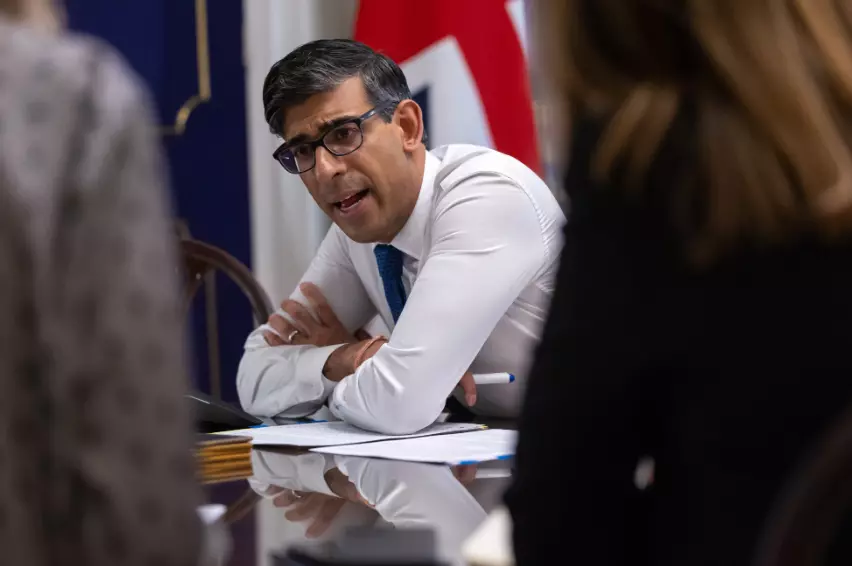
Why Sunak govt finds itself at odds with Britain’s views on Israel-Hamas war
Even as the British PM sacked junior minister Paul Bristow for demanding him to seek a ceasefire in Israel, Bristow represents 76% of Britons who want the war to end

British Prime Minister Rishi Sunak has sacked one of his junior ministers from his government. His crime was to ask for a ceasefire in Israel’s war on Gaza. Paul Bristow was dismissed from his position as parliamentary private secretary, which translates to being minister of state at the Department for Science, Innovation and Technology, after he wrote a letter to Sunak demanding the prime minister to seek a “permanent” break in hostilities between Israel and Hamas.
Sympathy for Israel, loss of words for Palestine
Sunak’s Conservative government has come out strongly on the side of Israel from the day Hamas launched a blistering attack on October 7, killing over 1,400 Israelis and taking around 230 as hostages. The Indian-origin premier was quick to follow in the footsteps of US President Joe Biden by going to Israel to stand in solidarity with the Jewish state. However, he has not said anything about the 9,000-plus Palestinians, mostly women and children, who have been killed so far in Israel’s airstrikes on Gaza.
In his letter Bristow said “a permanent ceasefire would save lives and allow aid to reach those who needed it most”. Sunak has rejected calls for a ceasefire arguing that Israel has a right to defend itself, but has supported “humanitarian pauses” to allow more aid to Gaza. The Israelis have rejected the demand for pauses.
Downing Street said Bristow was asked to leave his post as his comments were not “consistent with collective responsibility”. Collective responsibility is the convention that all members of the government must publicly support government policy, even if they do not agree with it personally.
Bristow not the only MP who wants a ceasefire
The unrepentant Bristow said, “It was absolutely the right decision for the prime minister to fire me. I obviously regret being sacked, but I can now talk openly about an issue so many thousands of my constituents care deeply about. I can better represent their views from the back benches than the government payroll”.
Bristow is a Conservative MP from Peterborough, a marginal constituency about 160 km north of London, and was elected from there for the first time in 2019 with a majority of 2,580 snatching the seat from the Labour Party. Around 18 per cent of Bristow’s constituency are Muslims and some of his constituents have been directly affected by the conflict.
While Bristow is the only Tory MP who has called for a ceasefire, at least 13 shadow ministers in the Labour Party and dozens of backbenchers have been urging an end to the fighting. Senior Labour leaders like mayor of London Sadiq Khan, mayor of Greater Manchester Any Burnham and the leader of the Scottish Labour Party Anas Sarwar have been asking Sir Keir Starmer, Labour Party leader to call for a full ceasefire. But so far Starmer has rejected these demands and backed humanitarian pauses a la Sunak. His argument rests on the premise that a ceasefire was not practical as it “would leave Hamas with the infrastructure and the capability to carry out the sort of attack we saw on 7 October”.
Pressure on Labour leader Starmer
Unlike Sunak, Starmer has not disciplined any of his colleagues for following their conscience and one MP of his shadow cabinet has insisted that it was only “right and proper” that they could split from the party line. At least 330 Labour councillors (elected members of local governments) have separately signed a letter urging Starmer to back a ceasefire in Gaza. Around 30 councillors have already resigned from the Labour Party and more resignations are likely to follow if Starmer does not change his stance soon.
One senior Labour party member described the resignations of councillors as “shaking off the fleas”. Predictably, the right-wing press has framed the resignations and protests as a Muslim issue, and yet at least two-thirds of the councillors urging a ceasefire are not Muslim.
No tolerance to pro-Palestine protests
Over the last three consecutive weekends, there have been massive pro-Palestine demonstrations in UK cities with tens of thousands coming out onto the streets. Home Minister Suella Braverman has described the demonstrations as “hate marches”, when thousands of people according to her “chanted for the erasure of Israel from the map”. She has urged police officers to take a zero-tolerance approach to antisemitism. Her comments have angered peace campaigners who argue that she has missed the point of the marches. Being pro-Palestine doesn’t make one antisemitic or for that matter anti-Israel.
The last time London’s Trafalgar Square saw such large protests was to stop the Iraq war. Change.org has had lakhs of UK citizens sign petitions calling for a ceasefire. Britain’s 3 million Muslims only account for 6.5 per cent of the population, whereas opinion polls have revealed that 76 per cent of Britons are in support of a ceasefire, showing that the protests cut across sectarian lines.
Initial images of Hamas' brutal attack on civilians had won sympathy for Israelis, but Israel’s disproportionate response, bombing homes, hospitals and refugee camps in Gaza has lost the state the support of the British public. As Bristow pointed out in his letter: “My constituents and I are deeply grieved by the heart-breaking and devastating humanitarian crisis now unfolding in Gaza. Thousands have been killed and more than one million now displaced. It is difficult to understand how this makes Israel more secure or indeed makes anything better”.
As in the Iraq war, Sunak, Braverman and the political establishment find themselves dramatically at odds with the country as a whole.

